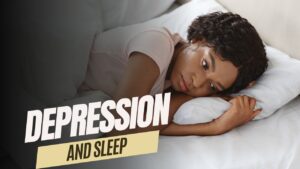Can CBD oil really help you sleep? We’ve all been there: tossing and turning, staring at the ceiling, and counting sheep that somehow turn into an existential crisis about whether we’ll ever get a good night’s sleep again. Enter CBD oil, the latest wellness trend that promises to solve all your sleep woes. But can CBD oil really help you sleep, or is it just another fad? In this post, we’ll explore what the science says about CBD oil and its effects on sleep, bust some myths, and offer tips on how to use CBD oil if you’re thinking about giving it a try.
Table of Contents
What is CBD Oil, Anyway?

First things first, let’s clear up what CBD oil is. CBD, short for cannabidiol, is a compound found in cannabis plants. Unlike its infamous cousin THC (tetrahydrocannabinol), CBD doesn’t get you high. It’s non-psychoactive, which means you can enjoy its potential benefits without feeling like you’ve taken a ride on a rainbow unicorn.
CBD oil is typically extracted from hemp plants, which are legally required to contain less than 0.3% THC. This means you can find CBD oil in health stores, online, and even in your local gas station (though we don’t recommend buying your health supplements next to the beef jerky).
The Claims: How CBD Oil Might Help You Sleep
Proponents of CBD oil tout its ability to help with a variety of ailments, from anxiety to chronic pain, and yes, even sleep. But how exactly does CBD oil claim to help you catch those elusive Z’s?
- Reducing Anxiety: One of the primary reasons people struggle to sleep is anxiety. Whether it’s worrying about tomorrow’s meeting or existential dread about whether you left the stove on, anxiety can keep you wide awake. Studies suggest that CBD may help reduce anxiety by interacting with serotonin receptors in the brain, which play a key role in mood regulation (Blessing et al., 2015). Less anxiety means a calmer mind, which might make it easier to drift off.
- Pain Relief: Chronic pain is another common sleep disruptor. If you’ve ever tried to sleep with a bad back or throbbing joints, you know what we’re talking about. Research published in the European Journal of Pain found that CBD could help reduce pain and improve sleep in people with chronic pain conditions (Vučković et al., 2018). By reducing pain, CBD may help you get comfortable enough to fall asleep.
- Regulating Sleep Cycles: Our sleep cycles are regulated by the endocannabinoid system, which is a network of receptors in the body that CBD interacts with. Some research suggests that CBD might help regulate sleep-wake cycles, making it easier to fall asleep and stay asleep. A study published in the Journal of Clinical Pharmacology found that CBD increased sleep duration in patients with insomnia (Carlini & Cunha, 1981).
What Does the Research Say?

While there’s a lot of hype around CBD oil, it’s important to look at what the science actually says. The truth is, research on CBD and sleep is still in its early stages, and most studies are small and have limitations.
- Small Studies with Promising Results: A 2019 study published in The Permanente Journal looked at 72 adults with anxiety and sleep issues. After taking CBD, 66.7% of participants reported better sleep after the first month (Shannon et al., 2019). While these results are promising, the study was small, and there was no control group to compare the effects against.
- Mixed Results: Another study published in the journal Current Psychiatry Reports reviewed existing research and found that while some studies show CBD can improve sleep, others show little to no effect (Babson et al., 2017). This suggests that CBD may work for some people but not others, and more research is needed to understand why.
- More Research Needed: Overall, the research on CBD oil and sleep is still in its infancy. While early results are promising, we need more large-scale, placebo-controlled studies to draw definitive conclusions about CBD’s effectiveness as a sleep aid.
How to Use CBD Oil for Sleep

If you’re thinking about trying CBD oil for sleep, here are some tips to get you started:
- Start Low and Go Slow: When it comes to CBD, less is often more. Start with a low dose and see how your body responds. You can gradually increase the dose if needed. Remember, everyone’s body is different, so what works for your friend might not work for you.
- Choose the Right Product: Not all CBD products are created equal. Look for high-quality, third-party tested products to ensure you’re getting what you pay for. Full-spectrum CBD oils contain other beneficial compounds from the hemp plant, which may enhance the effects of CBD (the so-called “entourage effect”).
- Timing is Everything: Take your CBD oil about 30-60 minutes before bedtime to give it time to take effect. You can take it sublingually (under the tongue) for faster absorption, or you can add it to a cup of herbal tea for a relaxing bedtime ritual.
- Consult with a Healthcare Professional: If you’re taking other medications or have underlying health conditions, it’s a good idea to talk to a healthcare professional before trying CBD oil. They can help you determine the right dose and ensure that CBD won’t interact with any of your medications.
Conclusion: Is CBD Oil the Sleep Solution You’ve Been Looking For?
CBD oil shows promise as a natural remedy for sleep issues, thanks to its potential to reduce anxiety, alleviate pain, and regulate sleep cycles. However, the research is still evolving, and CBD may not work for everyone. If you’re curious about trying CBD oil for sleep, start with a low dose, choose a high-quality product, and be patient. With a little experimentation, you might find that CBD is the key to a good night’s sleep.
So, while CBD oil might not turn your bed into a fluffy cloud of guaranteed sleep, it could be worth a shot. And who knows? You might just find yourself snoozing like a baby, dreaming of that rainbow unicorn after all.
References
- Babson, K. A., Sottile, J., & Morabito, D. (2017). Cannabis, Cannabinoids, and Sleep: A Review of the Literature. Current Psychiatry Reports, 19(4), 23.
- Blessing, E. M., Steenkamp, M. M., Manzanares, J., & Marmar, C. R. (2015). Cannabidiol as a Potential Treatment for Anxiety Disorders. Neurotherapeutics, 12(4), 825-836.
- Carlini, E. A., & Cunha, J. M. (1981). Hypnotic and antiepileptic effects of cannabidiol. Journal of Clinical Pharmacology, 21(8-9 Suppl), 417S-427S.
- Shannon, S., Lewis, N., Lee, H., & Hughes, S. (2019). Cannabidiol in Anxiety and Sleep: A Large Case Series. The Permanente Journal, 23, 18-041.
- Vučković, S., Srebro, D., Vujović, K. S., Vučetić, Č., & Prostran, M. (2018). Cannabinoids and Pain: New Insights from Old Molecules. Frontiers in Pharmacology, 9, 1259.
**Disclaimer:** I am not a medical professional, and this article should not be considered medical advice. The information provided here is based on my own research and is for informational purposes only. Always consult with your doctor or a qualified healthcare provider before trying anything that may affect your health or well-being.
**Affiliate Disclaimer:** Some of the links in this article may be affiliate links, which means I may earn a small commission if you click through and make a purchase, at no additional cost to you. Please note that I only recommend products and services that I believe in and have personally researched. Your support helps keep this website running, and I truly appreciate it!





